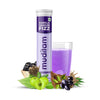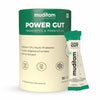Power of Daily Foods in Diabetes Management
Last updated on:
A well-imagined diabetic diet plan can ensure your blood sugar level remains within normal limits and at the same time keep you healthy and at optimum weight, avoiding possible complications. Now in the following sections, we are going to talk about the power of daily food in managing your diabetes as well as how some specific food items can contribute significantly to your health journey.
Unlike medication, diabetes management includes lifestyle interventions such as physical activity and a balanced diet. A well-structured diabetic diet plan is critical to help control blood glucose levels and promote overall health. In choosing your foods for diabetes, ensure that they will add positively to your well-being.
Essential Components of the Diabetic Diet Plan
- Whole Grains: One usually consumes whole-grain food items like brown rice, quinoa, and whole-wheat bread. Whole grains are rich in fiber, which slows the rate at which glucose enters your body, and also aids in good digestion.
- Non-Starchy Vegetables: Spinach, broccoli, bell peppers, and more are low in calories and carbohydrates. They are ideal for a diabetic diet plan because they provide essential vitamins and minerals and do not increase blood sugar levels.
- Lean Proteins: Chicken, turkey, fish, and legumes are good sources of protein, which help keep one full for a longer time and aid in controlling blood sugar levels. Lean proteins are also supportive of health and muscle repair.
- Healthy Fats: Including healthy fat sources such as avocados, nuts, and olive oil can improve heart health and provide energy without negatively affecting blood sugar levels. Healthy fats also contribute to the absorption of fat-soluble vitamins.
- Fruits: Although fruits contain natural sugars, low glycemic index fruits like berries and apples provide essential fiber and nutrients without significantly impacting blood sugar levels.

Foods to Avoid in Diabetes
Even though there are foods that help in managing diabetes, there are certain foods that are pretty dangerous for a diabetic to consume
- Sugary Beverages: Sugary beverages cause a sharp increase in blood glucose levels. Good substitutes for soda, sweetened teas, and fruit juice include water, unsweetened tea and coffee, and some low-calorie sports drinks, as they provide no calorie supply.
- Refined Carbs: Foods like white bread, cakes, cookies, and other refined products raise blood glucose quickly due to their limited fiber content. They are often high in added sugars and unhealthy fats.
- Fatty Meats: High-fat cuts of meat are associated with an increased risk of heart disease, which is especially concerning for individuals with diabetes. Excessive saturated fat intake can lead to weight gain and contributes to inflammation.
What is Meal Planning?
A formal meal plan is a good strategy for managing diabetes. A well-planned diabetic diet plan helps in balancing meals with medications. Here are the tips for successful meal planning:
- Portion Control: Understanding portion sizes helps prevent overeating and keeps blood sugar levels stable. Eating from smaller plates and eating slowly can be effective strategies for portion control.
- Fixed Time of Meals: Having meals at consistent times helps maintain balanced insulin and energy levels throughout the day. Blood glucose levels can become unstable if meals are missed or if there are long gaps between them.
Healthy Snacking Healthy snacking on nuts or yogurt prevents low blood sugar between meals. Include snacks rich in protein, fiber, and good fats that satisfy and regulate blood sugar, too.
Another diabetes management imperative is to drink water. Water will be your best choice of beverage since it is healthy and will not add calories or sugar to your body. I like to have herbal teas, and infused waters with slices of lemon or cucumber, as refreshing alternatives.
Conclusion
The bottom line is do not underestimate the power of everyday foods in diabetes management. A holistic diabetic diet plan that includes whole grains, non-starchy vegetables, lean proteins, healthy fats, and fruits chosen properly can also make a difference in your health outcomes. This is how you empower yourself to take effective charge of your diabetes management: avoid sugary drinks and refined carbohydrates and focus on portion control and meal planning.
Choosing Foods for Diabetes From the daily choices you make about what you eat, you add quality to your life and pave the way for better long-term health outcomes. Remember, each little change contributes to the broad journey of wellness in the management of diabetes.














